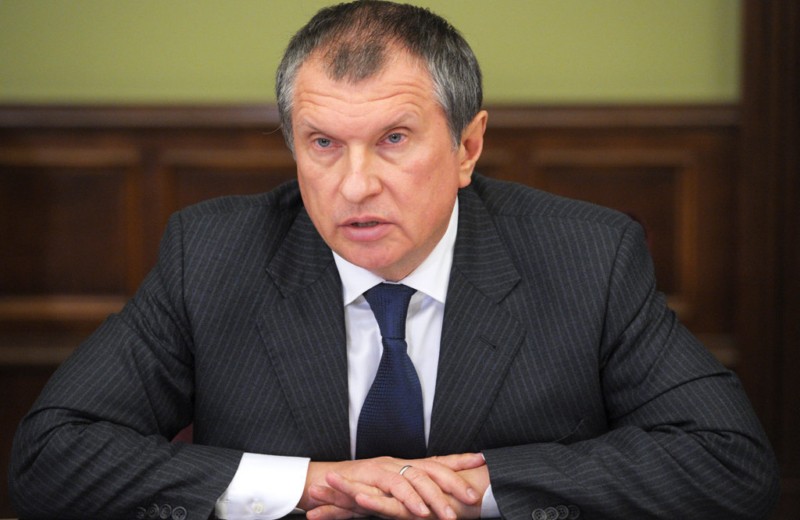On April 28, the White House announced a fresh round of sanctions on seven Russian officials and seventeen corporations
Concurrently, Brussels added fifteen names to its list of sanctioned officials.
The sanctions come amidst mounting evidence that Russia is promoting separatist violence in eastern Ukraine. A White House statement called Russia’s role in fomenting insurrection in Ukraine’s eastern regions “indisputable.”
Speaking in Manila on April 28, President Barack Obama said the goal of the sanctions is not to attack Russian President Vladimir Putin personally, but rather to “change his calculus with respect to how the current actions that he’s engaging in Ukraine could have an adverse impact on the Russian economy over the long haul.”
Among the officials sanctioned by Washington are two of Putin’s closest associates, Igor Sechin and Vyacheslav Volodin.
Sechin is the president of Rosneft, a Russian state-owned energy giant, and has close ties to the FSB, the successor to the KGB.
Volodin is a former parliamentarian who is now one of Russian President Vladimir Putin’s most trusted aides.
Oleg Belaventsev, Putin’s Envoy to the Crimean District; Sergei Chemezov, the Chairman of Rostec, a state-controlled technology corporation; Dmitry Kozak, Russia’s deputy Prime Minister; Evgeniy Murov, the Director of the Russian Federal Protective Service; and Aleksei Pushkov, the Chairman of the Russian parliament’s Committee on International Affairs, round out the list of officials sanctioned by Washington.
Many of the names on Brussels’ list are responsible for integrating Crimea into the Russian Federation economically and politically.
Others, including Igor Strelkov, are have been accused of promoting separatism in eastern Ukraine. Strelkov, who is on the staff of the Main Intelligence Directorate of the General Staff of the Armed Forces of the Russian Federation (GRU), has been tied to separatist violence in the city of Sloviansk in Donetsk Oblast.
SMP Bank, InvestCapitalBank, TPS Avia Holding, and SGM Group, which are controlled by Boris Rotenberg and his brother Arkady, a long-time friend and childhood judo partner of Putin’s, are on Washington’s list of sanctioned corporations.
Stroytransgaz, which is owned by Gennady Timchenko, and Sobinbank (a subsidiary of Bank Rossiya), which is owned by Yury Kovalchuk, have also been sanctioned.
Kovalchuk and Timchenko, who was among 20 Russian officials initially sanctioned by the White House after Russia’s annexation of Crimea in March, are both members of Putin’s inner circle.
The sanctioned individuals’ assets in the U.S. will be frozen, will not be allowed to travel to the U.S., and according to the Treasury Department, U.S. citizens will be largely prohibited from dealing with them.
Despite dealing another blow to some of Putin’s closest associates, the newest iteration of sanctions is most notable for its omissions.
Russia’s largest state-owned energy companies, Gazprom and Rosneft, managed to escape sanctions, as did Vnesheconombank (VEB), Gazprombank, and Sperbank, three of Russia’s most powerful banks.
Alexey Miller, the CEO of Gazprom, was also absent from the list of sanctioned officials.
American officials had threatened to levy sanctions against entire sectors – including the finance and energy industries – but ultimately shied away.
In addition to the new sanctions, State Department Spokesperson Jen Psaki announced on April 28 that the U.S. is “implementing additional restrictive measures on defense exports to Russia” by “expanding its export restrictions on technologies and services regulated under the U.S. Munitions List.”
Still, the sanctions were more restrained than many analysts predicted.
The MICEX, the Russian stock market, rallied after the White House’s announcement, finishing the day up 1.63 percent.
Thus far, Western sanctions have taken their toll: experts believe capital flight from Russia may reach $160 billion in 2014.
Though the Russian economy sputtered in the first quarter of 2014, and analysts predict negative growth this year, Putin’s popularity has increased considerably: according to the Russian state polling service VTsIOM, in mid-March, when Russian annexed Crimea, Putin’s approval rating stood at 72 percent, up 10 percent from earlier in the year.
Putin’s aggression in eastern Ukraine has been one driver of this popularity. If sanctions further cripple the economy, many fear that Putin will compensate by pursuing a more aggressive foreign policy.
Kyiv Post staff writer Isaac Webb can be reached at isaac.d.webb@gmail.com and on Twitter at @IsaacDWebb.



